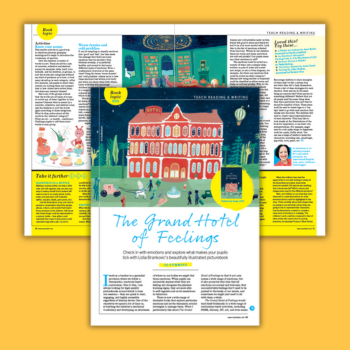Use The Grand Hotel of Feelings in KS2 to help pupils investigate their feelings and emotions.
I work as a teacher in a specialist provision where we follow a therapeutic, emotions-based curriculum.
Due to this, I am always looking for high-quality picturebooks to base our sessions around; they are quick to read, engaging, and highly accessible regardless of literacy levels. Perfect for books for topics KS2!
One of the objectives we spend a lot of time on, is building the children’s emotional vocabulary and developing an awareness of where in our bodies we might feel those emotions.
When the children can more accurately express what they are feeling and recognise the physical warning signs, they are more able to self-regulate and avoid escalations in behaviour.
There is now a wide range of fantastic books that explore particular emotions. They invite discussion around strategies to manage them, too.
The Grand Hotel of Feelings
What I particularly like about The Grand Hotel of Feelings is that it names a wide range of emotions. But it also promotes that idea that all emotions are normal and welcome; that uncomfortable feelings don’t need to be pushed to the backs of our minds, and sometimes we might just need to sit with them a while.
The Grand Hotel of Feelings would lend itself brilliantly to a wide range of curriculum-based activities, including:
- PSHE
- Literacy
- DT
- Art
- Music
PSHE feelings and emotions KS2
Statutory guidance for PSHE states that, by the end of primary school, pupils should know:
- That mental wellbeing is a normal part of daily life, in the same way as physical health.
- That there is a normal range of emotions (e.g. happiness, sadness, anger, fear, surprise, nervousness) and scale of emotions that all humans experience in relation to different experiences and situations.
- How to recognise and talk about their emotions, including having a varied vocabulary of words to use when talking about their own and others’ feelings.
- How to judge whether what they are feeling and how they are behaving is appropriate and proportionate.
Jo Cummins is an advisory teacher for a specialist provision, an experienced English lead, and a children’s book blogger. She has been part of the judging panel for several children’s book awards and has delivered workshops at conferences across the country. Follow Jo on X at @BookSuperhero2. Browse more recommended KS2 books for topics.











